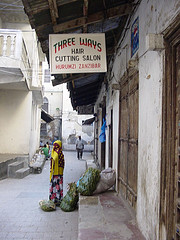The Home of Swahili
I think it's fair to say that Zanzibar is the home of Swahili language and culture. The dialect of Unguja, Kiunguja has been adopted as the standard for all Swahili dialects. The name Zanzibar is connected to Zanj (black), the name used by medieval Arabs for the East African coast. As the language of trade, Swahili also has native speakers in the coastal areas of Tanzania, Kenya and Somalia, as well as in the Comoros islands and, due to inland trade, there are more obscure versions of Swahili, such as Kingwana, spoken by small tribal groups in the eastern provinces of the Democratic Republic of the Congo. It's a lingua franca in all of these countries, except Somalia and is becoming increasingly popular in neighbouring countries like Uganda.
Swahili on the web
 |
| Zanzibar street sign by Al Stevens |
The use of Noun Classes
Like most of the other Bantu languages, Swahili employs noun cases to categorise nouns. These are usually indicated by prefixes, eg. m-/wa- (denoting nouns connected to people) or ki-/vi- (denoting things which are man-made, including languages). Linguists have identified up to 16 of noun cases in Swahili, although this is a bit controversial, as it is based on the Meinhof system, which counts singular and plural noun cases separately.
For Example
There are some very good examples of Swahili noun cases on Wikipedia, one of which I'm summarising here, as I thought it was quite interesting. It relates to the Bantu noun classes 3 m- (singular) and 4 mi- (plural), which are often called the 'tree' classes and are mostly used with things that occur naturally, but are neither human nor animal, things like . . . well, trees! This group includes words like, mwitu (forest) and mtama (millet), but also things which are usually made from plants, eg. mkeka (mat - although these are probably made from plastic nowadays!).
 |
| Zanzibar beach by Al Stevens |
This group also includes natural and supernatural forces, such as mwezi (moon), mlima (mountain) and mto (river). The group is also extended to include 'things that spread', like the branches of a tree, so we get words like mwavuli for umbrella and moshi for smoke. This group also includes more abstract words like mpaka (border) and mwendo (journey). Of course, the noun class doesn't just affect the noun, but also influences the form of the adjective and verb which, I guess, means you really need to know your noun classes in order to speak Swahili properly!
Noun Classes around the world
I think it's fair to say that noun classes are a fairly unfamiliar concept to speakers of Indo-European languages (like English), although I think we do differentiate between animate and inanimate objects, to a degree. It's interesting that noun classes tend to exist in societies that live in closer harmony with the natural world - they can be found in Native American languages, the Bantu languages of Africa and Aboriginal languages of Australia, like Dyirbal and Ngangikurrunggurr. They're also found in a handful of Causcasian languages, notably Bats which is spoken by a small number of people in a remote mountain village in the north-east of Georgia. I wonder if the death of animist traditions and beliefs, led to the death of noun classes in other world languages?
Noun Class v Gender
 |
| Three Ways Salon by Al Stevens |
Perhaps then gender, in European languages, is a vestige of earlier, more complex, noun classes? English has almost completely got rid of gender, each phase of 'modernisation' of the language has used gender distinctions less and less. Perhaps the trend in language development is away from the use of noun classes? There are certainly more nouns (or things) to talk about these days, than there were in the eras of our grand-parents and ancestors and, perhaps, this makes the categorisation of nouns too complex to even bother with? I wonder how Swahili deals with modern inventions, such as computers or iPhones?
I'm going to leave you with a video from YouTube, which was posted by www.bookbox.com - a project which helps children learn languages through story-telling. The story is called The First Well and is spoken in the Kenyan dialect of Kiswahili.
Image credits:
For this blogpost I wanted to highlight the work of flickrmember almacaw aka Al Stevens, who lives in a small village in Sussex. You can see more of Al's images at his photostream and find out more about his approach to web design on his website.
Thanks Al for sharing these images of Zanzibar using the Creative Commons license.

No comments:
Post a Comment